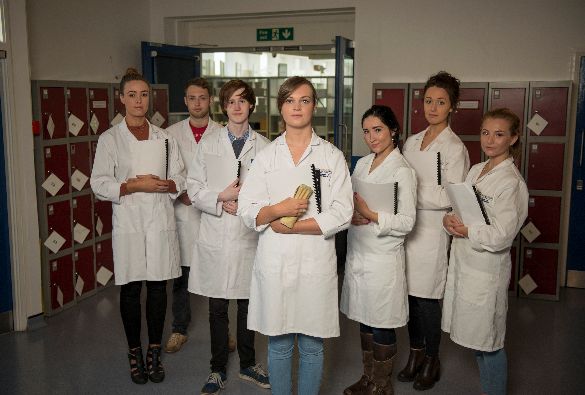Episode one of Channel 5’s ‘Body Donors’, which follows the experiences of two cancer patients, as well as staff and students at the University of Liverpool’s Human Anatomy Resource Centre (HARC), was watched by over one million viewers and trended at number one on twitter when the series premiered last week.
HARC Bequeathal’s Officer, Dee Tully, received more than 75 calls from people wanting to consider body donation in the first 48 hours of the programme being aired.
The final episode of the series, where audiences will get an insight into how body donors are used for medical teaching, screens tonight at 9pm.
Dee Tully, Bequeathal’s Officer
“The people that contact the HARC to donate their body inspire me with their stories and reasons for wanting to donate. The most remarkable people are those who have had vital lifesaving surgery and want to give back to the medical profession, as well as those who are terminally ill, who want our future doctors to learn from their donation.”
Dr Alistair Bond, lecturer and researcher
“There is no doubt in my mind that the use of real cadavers makes an awful lot of difference to the education of students and their ability to treat people in the future. I don’t believe that any model, computer programme or text book will ever come close to aiding in the study of anatomy as the ability to dissect a cadaver does.”
Emily Tasker (centre) and first year students
“I was determined to overcome my initial emotional reaction to our first dissection class, not only for the sake of my own education, but to honour the lives of our generous donors, without whom I may not become the medical professional I aim to be.”
Paul Rothwell, with Julie Clarke, technician
“The television production crew were very easy to work with and soon became part of the HARC team. They treated our donors with great respect in life and in death. We wanted to show with this documentary that a body donor is invaluable in helping others to learn about the human body.”
Lynne Jones, Technical Manager
“Students really appreciate the gift of body donation and treat it with great respect. When they graduate, they also have the opportunity to carry out Continuing Professional Development courses on donated material; those that do, tell us that they always reflect back on their first experiences of dissection.”
Annabel Malkin, student
“After talking to family and friends about the programme I was featuring in, and my personal experiences during dissection classes, I think body donation is definitely something people need to know more about. For us, as students, it really helps us grasp the complexity of the human body and gives us an insight that we wouldn’t be able to get simply from textbooks and lectures.”
Phil Jones, technician
“Body donation is an incredible gift to the University. It is because of their selfless act that we have amazing doctors, dentists, surgeons and radiographers. Without these donations we would not be able to research, develop and cure a whole host of diseases and make advancement in areas that have caused pain, suffering and death for so many years.”
Emily Baxter (right), with Daniel Brownhill and Emily Tasker, students
“Working with a cadaver has certainly confirmed my passion for human anatomy. I wish to pursue a career within the paediatric division of medicine in order to turn my core knowledge into practical solutions, so that one day I will be able to contribute to improving the health and wellbeing of the wider community.”
